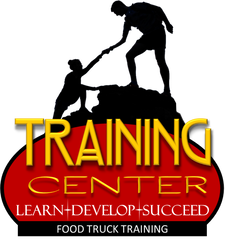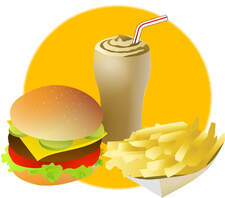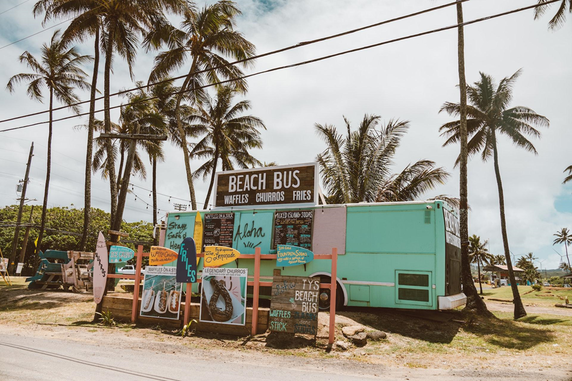Sounds awesome, right?Let me share an unfortunate business fact... Owning a food truck and surviving into the fourth year ain’t easy. Especially if you have little food service experience and/or no business experience. The trick is how do YOU beat those odds? I know YOU want to join the ranks of the SUCCESSFUL 40%, right? So, let’s get down to it… When someone says their dream is to operate a food truck, my first question is always “why?” The reason always boils down to “short term problem creates high motivation for personal change”, but and this is a BIG BUT, often the person has little industry knowledge and little to no business experience. “The Great Food Truck Race” makes it look easy, right? Many folks never have any real success in food trucks because first, they don’t have a plan or the worst decision of all… just jump in buy a truck THEN figure out what to do. In every case this lack of knowledge is costly, frustrating, and highly inefficient. If the first thing those folks did was buy a food cart or trailer, they have ALREADY wasted considerable time and resources. They own an expensive asset just sitting collecting dust as they “figure it out”. Food service is all about efficiency – no wasted time, money, product, or effort. If you have been thinking about opening a food truck (trailer or cart) you are at the IDEA stage, so let’s refine your idea just a bit… IDEA - Imagine what type of vending you would love. Commercially packaged snacks & drinks. (i.e. Ice cream truck) or Minimal risk or commercially pre-cooked foods. (i.e. funnel cakes, kettle corn, hot dogs) or Full prep including cooking raw proteins. (i.e. tacos, burgers, BBQ, etc.) Each of these will have different rules based on your state laws and regulations. Oh, and county & city level rules, too. Some states have a different license for each of those vending types and even various levels within those different categories. There are some states that do believe in simplicity having only one or two license types. Luckily, there is only one Federal level task you need to complete, and this is getting your EIN. Don’t know what that is? That is where STEP 2 comes in. More on that in a moment. Imagine working each of those different vending types. Which one excites you and makes you want to start RIGHT NOW? Let me caution you if your first thought is “which one makes the most money?” You are already headed down the wrong business path. Food service at any level takes a commitment of challenging work, long hours and dealing with a hungry (and often grouchy because they are hungry) public. The most successful vendors have a love of cooking, serving the public and are students of the industry, educating themselves daily. Yes, learning and improving never ends! Once you know which vending type is a perfect fit for you move on to… LAWS - Research state, county, and city laws.Laws on food, peddling, vending, safety, fire, taxes, etc. * Go to your favorite search engine and search your town or city by name and add “starting a business”. Look for checklists on what is needed, as well as, lists of office/department names and officials you will need to contact. * Repeat the same search at the county level as well. * Search for your state’s department of revenue and research starting a business at the state level. * Go to the IRS.gov web site and search for starting a business and follow its links. This is where you will find the EIN (Employer Identification Number). There’s the answer!!! If you need clarification call an official and ask all the questions you have. Remember, YOU are gathering all the pertinent information BEFORE spending money. Only go to official state, county & city sites. Sites usually end with .org, .edu, .gov, or, .state.us (i.e. fl.us) Ad sites like legalzoom.com will come up above official sites. The ads are designed to sell services you don’t need right now or perhaps never. Often the ad sites contain very outdated information, broken links or even attempt to look “official”. Remember only go to verifiable official city, county, and state government sites. By this point you have a few hours invested in research and should have a general idea about regulatory costs before making the big purchases of a vehicle and supplies. Keep a list of all the costs for each permit or license, you’ll need it later when you write your business plan. You must understand your area’s regulations to operate within those regulations. Take all the time you need to study those laws, regulations, and state level Food Code. Understanding your rights and limitations within those local rules will save you future headaches. Here are a few places to call or search online:
Once the research is complete it is time to figure out what food to sell, remembering your vending type and the rules you just researched. MENU - What will you sell? The only question that matters at this point is: What is missing from your local food scene that you would be proud to sell and is within your current skill level? No matter how awesome your BBQ may taste if you enter the field as the 27th BBQ truck in your area it will take time to establish yourself. Do you have the time and money to build your brand up to the sales level you need? If you do, GREAT! If not, look at other foods that meet the question – “missing from the food scene”, “proud to sell” AND “within your current skill level”. “Missing” could also mean underserved. If your city population is 10 million being the 27th BBQ truck is probably not a bad thing. The key point here is filling a food need in your area will help get you off the ground faster. People will try your food at least once if it is something they can’t easily find elsewhere. Then it is up to you to encourage repeat visits by combining delicious food with great service. “Proud to sell” keeps you focused on quality. Which in turn will reward your bank account. “Current skill level” helps reduce your frustration as you are learning other necessary skills, like bookkeeping, marketing, inventory, sanitation, guest service. The last thing you need is to also learn a new cuisine, too. You can always expand your cooking skills once the business is off the ground. Once you have the “what” of your menu next is finding a supplier or three for your food. Warehouse stores are the place first timers turn. A Sam’s Club, Costco or BJ’s are often found in most towns. Bigger cities may have a Restaurant Depot. Of course, there are big suppliers that may deliver to you. (Sysco, US Foods, GFS, Chaney Brothers) You could order online from a site like https://www.webstaurantstore.com/ as well. Now that you know what you are selling and where you will get your supplies, it is time figure your portions and costs. Down to the ounce and specific recipe amounts. List everything even salt for fries. Don’t forget paper serving products, straws, napkins, etc. You will need to know this information for the next part of the menu process and the one most newbies struggle with the most: Pricing your menu! Many newbies tend to under value their menu believing price is the only driving factor in choosing a place to eat. The problem is they are looking at pricing through the lens of their own life experience and spending habits. Or they seek online advice and are told “three times cost” is the rule of thumb. It was in 1980. I was there then. In 2020 figure prices at a MINIMUM of 4 times cost with 5 or 6 or more times for certain items. Finally, after figuring your food / paper costs, portioning, and menu price, all that is left is to consider how you will cook your foods and on what equipment. Everything will need a storage home too. As in hot holding (i.e. steam table), cold holding (i.e. condiment station, freezer, refrigerator) and dry storage shelving needs. Don’t forget utensils, scales, and other small wares (pots, pans, lids, plastic storage). Make a list, you’ll need that later too. Besides food to sell there are a few other supply and service necessities… SHOP - Supplies and Services You already know you need food and paper products to sell, right? But there are other products and services you need. What about clean up, sanitation, a place to store and prep food, an attorney, accountant or even a repairman? Some of those you will need daily, others only occasionally, and a few (hopefully) rarely. Setup these services BEFORE you have an emergency and need them. Emergencies force bad and expensive decisions. In no particular order you will need, at the very least, a(n):
This is the point where you can make an informed decision on your official business organization. There are 4 main types: sole proprietorship, partnership, corporation, and Limited Liability Company (LLC). Each of these also have a corresponding Federal Tax filing status except LLC, if you are an LLC you get to choose between your filing as either a corporation or sole proprietor. Talk to an attorney or accountant about these crucial decisions. Each of those business organizations have different rules and obligations for each state. The only people capable of giving you great legal advice are the professionals from your area that are also aware of your personal and financial needs. Final word… be extremely careful of whom you seek counsel when you get to the Advisor/Mentor part. Joining a food truck group on Facebook is a wonderful place to find support, however, not everyone in those groups is experienced, knowledgeable or principle centered. Often groups have trolls posting bad advice and insulting honest newbie questions just for laughs. Look at the admins of the group and check their profile. In 90% of the cases the admins don’t even list their own vending business in their work history. Any illegal, bad, or fraudulent advice is often ignored because the admins simply don’t care or know any better from their own lack of industry experience. Newbies will ask a simple question like “what is the best POS?” and invariably a dozen or more people answer “Square”, yet most of those people have never tried more than ONE system. These types of questions are really popularity polls, as opposed to reviews revealing the best out of the 50 or so POS systems a food vendor could choose. Popular does not equal BEST. Take all advice with a grain of salt. Likewise, other social media platform groups are also a gamble as to whether the information is valid or from an attention seeking troll. This group (in my humble opinion - THE best group) has admins with a combined seventy plus years in food service and street vending. It is a highly moderated, social learning group, full of teaching posts called “Units” as well as the general discussion area. WHERE - One or several venues to sell your food. Vendors need a safe and publicly accessible site to create daily income, however, the most profit is found vending at large public events. Don’t forget catering and private corporate gigs. Of course, there is the venerable route driving like an ice cream truck, as well. All of these are viable sources of income. Pick one or all as your business model revenue stream(s). First you must deal with the limitations placed on street vending by your town. All that research you did earlier comes into play now. You may have found limits on where you can set up, how many hours you may stay in one spot or that your town has a wait list for vending permits. If you can vend daily, you will need a place (or places) to set up or a route to drive. Make a list of places you would like to explore. Places that already have people gathered to shop or work. Such as: grocery stores(Kroger, Publix, H-E-B), Dollar stores (General, Family, Tree), big box stores (Best Buy), hardware stores(Ace, Lowes, Home Depot), furniture stores, vacant lots on high traffic streets, public gathering places (parks, boat launches, beaches, lakes, swimming pools, sporting events, kids sporting events/practice fields), court houses, large office buildings, construction sites, large home owners associations, call centers, distribution centers (Amazon, Fed Ex, UPS) hospitals, medical centers, shopping centers, boardwalks, car dealer ships, auctions, flea markets, industrial complexes, ship yards, malls, outlet centers, car washes, etc. Don’t overlook Apartment complexes, Homeowner Associations, and RV parks. Don't stop until you have one hundred potential places to vend. If you live in a small-town shoot for fifty. They are there, just look. Weed out the list by visiting the location during the times you wish to vend and observe foot traffic and vehicle traffic patterns. Talk to employees, security guards and customers of the business. Is the business as busy (or slow) as it appears on the day you visit? Is delicious food readily available nearby? Count foot traffic while you are there. Also look up vehicle traffic on your state DOT website or ask a real estate agent for demographics. Vehicle traffic is important for your advertising & signs getting people to notice and remember your business. You will need at least two hundred people an hour passing by to make the site potentially profitable. (The more the better) Call all the promising locations and ask to speak to the person having the authority to authorize a food vendor on site to feed customers and employees. You will have lots of “No” replies before finally getting one “yes”. An EVENT in street vendor parlance is a vending opportunity taking place at a locally or corporately sponsored occasion designed to celebrate or highlight some aspect of local or business life. These occasions draw people to a large outdoor site where games, rides, arts, crafts, concerts, petting zoos, comedy acts, local harvests, general entertainment, exhibitions, and other activities are presented for the enjoyment of attendees. Notice that food is NOT a primary reason people attend events. Every state and many counties have these large events that last from a single weekend to 2 weeks or more. The draw in these events is NOT food vendors. The focus for attendees is on ALL the other activities and food vendors are just a simple convenience necessary for the attendee’s overall enjoyment of the event. Many food vendors look at events as a money grab and do not really try to operate in a safe, sanitary, and guest centric manner. The opinion of these food vendors is “one and done” treatment of their guests. These poor vendors do not attempt to build repeat business, often having ridiculous long lines and bragging about it as if their food is so good people can’t live without it. Guess what the event promoter will do next year? Add more food vendors to keep the lines shorter. Remember people standing in line to buy your food aren’t spending money where the promoter wants them to spend money. Long lines encouraged the promoter to add more food vendors or require a percentage of sales in addition to other fees. If you don’t see the problems with operating in a “one and done” fashion, expect to be one of the 60% failures mentioned earlier. Catering and private gigs are great sources of revenue as well. Adding a simple “We Cater” on your vehicle and business cards opens those business opportunities. But we do need something to cook in and on… EQUIP - your business. Before we start looking at carts or trailers, I want you to understand you are NOT BUYING A BUSINESS. You are buying a piece of equipment for your business. Food service, street vending, catering & restaurants are all about delicious high-quality food, delivered by fast and friendly staff in a clean and sanitary environment. Based on your local rules and laws (you researched earlier) and the menu (you designed earlier), what equipment did you deem necessary? Remember the list you made? Have that list in hand when you start shopping. Set an equipment budget and stay within it when you shop. Budget determines new or used equipment. DIY is an option if you have the skills and time to build. For my money, purchasing used is the way to go. But if new is what you want, consider the following and tread carefully while shopping. Trailer and truck manufacturers have different standards for the same products. For example, do they build from the ground up or buy and convert a simple cargo trailer? Cargo trailers are not braced to hold exhaust hoods or air conditioners. Cargo trailers generally are not insulted so they heat up like a tin can sitting in the sun. When the cooking starts it gets worse! Cargo trailers are often made from wood, not sealed on the underside, have stiff or little shock absorbing capabilities. Make sure you understand what you are buying. Don’t fall for manufacturer sales pitches. You have done your homework on what is needed to legally start your business as well as, what is required by regulatory agencies. Your equipment must meet those requirements. Manufacturers will state they will (or have) worked with all the various health departments and their designs will pass inspections. However, buried in the paperwork will be a disclaimer putting the final approval on you, regardless of if it will pass the “mean old” health department or not. Get started with your purchase based on your budget. If you must have a new cart or trailer, factor in shipping or pickup and turnaround time. Assume they will miss the promise date. Read everything you can find about the manufacturer BEFORE ordering. Every manufacturer has good and bad points. Besides the trailer you will need small wares. Again, shop used restaurant supply stores and check local equipment auctions (if you have them). It could be the difference in you paying $7.00 for a single pan or getting half a dozen for a $1.00. Being frugal with equipment purchases allows you more spending flexibility with your food, paper, supplies and last-minute expenses that invariable creep up. PLAN - Write a business plan “Do I really need a business plan?” If you have to ask you aren’t ready to run a business. Every profitable business has a plan. Even the ones that brag about not having a plan. Their plan is to join the 60% of business failures. A business plan is an ever-changing document, often morphing into something completely different than originally written. Research will only take you so far. Practical application of your plans will change and grow as you gain real world experience. The core business plan framework will remain, and many elements will continue to work well after opening day. A business plan is your opportunity to prove to yourself as well as any commercial, angel or family investors that the business idea is operationally sound and profitable. Buying a bunch of cooking equipment and tossing it in a trailer with a couple hundred dollars of food is not a business. It is a recipe for financial disaster and embarrassment. Many food vendors barely survive often depending on ever diminishing cash flow rather than profits to stay viable as a business. Riches do not come by crossing your fingers and walking through the day hoping. Riches and wealth come from well-laid plans. - Jim Rohn People come in with business plans and, I mean I know that no one is going to meet everything they say in a business plan, but you got to have something to guide towards. - Arthur Rock Small businesses, you can give them capital, but what they often need as much is mentoring, advice and help with their business plan. - Karen Mills All those lists and notes you have been writing come into play as you start your business plan. The key elements of a food business plan are: Executive Summary
DO NOT USE A BUSINESS PLAN WRITING SERVICE. Your business plan is too important to delegate to a stranger from some other area. You have expertise and knowledge about your area that a writing service simply cannot Google. Likewise, your passion for your food and business could never be expressed by anyone other than you. MARKET - Let people know you exist and invite them. the world of the small food business operator, marketing is simply the invitation to “please eat my food.” The “invitation” is extended via branded umbrellas, A-frame signs, feather flags, flyers, menus, business cards and having an inviting set up. Once your guests RSVP your invitation it’s all up to your impeccable service, high quality and shining sanitation to encourage a big purchase AND develop a loyal repeating guest. Each of these elements (QSC) reaffirms your guest’s decision to choose you as their next meal. Once you understand marketing is a 24/7 job and you are actively marketing every working moment your business will flourish. Here is a shortish list of Marketing tips and must dos: Social media is necessary. Facebook and Twitter at the very least. Instagram is the hot media right now for food vendors. Pictures do the selling for you. Use some type of guest loyalty program. Punch cards where your guests get a free something after purchasing a certain number of the something work quite well. There are many subscription-based loyalty programs available with many POS systems. No cards to lose! Bounce back coupons. A bounce back coupon is a coupon you give guests that visit today to encourage them to “bounce back” sometime in the future. Print and passing out flyers is a wonderful way to meet businesses near your location. Signage. On location, you will need at least one sign with a product and a price point. Feather signs, lighted arrows, windsock, yard signs and umbrellas with logos all help define what you are selling and draws attention to you. Flash = Cash. A well-lit trailer with a colorful wrap commands attention. Instinctually humans are drawn towards things that make us feel good. Community Involvement. Involvement in your community will do amazing things for your sales. For example, setting up fund raisers for schools and civic organizations Apps. There is an ever-expanding group of food truck/cart related apps. They help with social media posting, posting current locations, push notifications, and getting bookings for events and catering. Website. Many food vendors only web presence is Facebook. While Facebook is a “must do” as far as business promotion, it SHOULD NOT be the only way. Facebook (and all other social media platforms) own all your content and if they decide to ban your business page because you supported a controversial politician or took an unpopular business stance all your marketing presence there disappears. A word of caution – when you start a new business it becomes a target for salesmen. They will circle like vultures offering any and every service and product. Many of which your new business will need to grow into before realizing the full benefit of those services. Credit card processing and social media services are just two of many that will beat down your door or blow up your phone to offer their wares. Be selective and only purchase AFTER you have time to research and sleep on it. Any salesman that wants an immediate answer is more interested in their own commission than your business’s wellbeing. If they say the price goes up tomorrow just hang up. It is an artificial emotional sales tactic. Also be extremely skeptical of any business website that does not display pricing. If you must set up "demonstrations" or "we will call you soon" without prior notification of price you can rest assured the price is higher than other services. Those salesmen or affiliate representatives are paid commissions, guess who is really paying the commission. Food service is about efficient use of resources. If a company wanting my business forces me into some "sales funnel" scheme, that company does not fully understand the food business and does not deserve my money or yours. MENTOR - Find one from the industry Inexperienced food service owners need help, especially if they're new to starting and growing a business. Newbies may seek help from more experienced vending colleagues who can teach based on their own experience or a newbie may seek guidance from professionals (like the SBA) who've had business experience. (but not necessarily food business) You will find some food truckers to be open and honest with advice and willing to help you get started. While other vendors look at you as competition and refuse to help or worse give you bad advice. (remember the Facebook trolls from earlier?) As a newbie telling the difference in good advice and bad is difficult. Seek your food truck advisor and business coaches very carefully. The keys elements are: Formal Food Training. There is a small handful of vendor specific training available. Such as Hot Dog University which is sponsored by Vienna Hot Dogs. The best alternative is formal restaurant training for managers. Chef or employee level experience is nice but lacks concentrated business training. Formal Trainer Training. Currently in the US there are tens of thousands food managers at all levels. Ninety percent of those received formal training from a corporately trained trainer. Those trainers know food service and know how to communicate that knowledge to trainees. Experience. Across distinct types of vending and locations. What works in rural Tennessee simply does not translate to downtown Miami. Coach mentality. A coach holds you responsible for your results. Keeping you focused on your goals. Providing the kick in the pants when you need it and cheerleads the celebration for your successes. WARNING - What you don't know will hurt......your business and your bank account. I have a solution to help you succeed at a price you won't believe! The Ultimate Food Business Training CourseA 250+ page textbook PDF you can put on any device and study anywhere. Inside you’ll find in depth details on:
PLUS - Bonus sections on Catering, Starting with Little Cash, Understanding Credit Card Processing, Vehicle Security and more. An 80+ page printable workbook and study guide to keep you on track towards your goals
But you’ll need more than just a book to be successful… To get you profitable fast I am including: Over a dozen Word Document and Excel Spread Sheet Templates covering important facets of your vending business:
PLUS – A Food Truck Business Plan template with an Excel financial projection template. The template includes instructions and examples of what you should write plus the Excel spread sheet helps guide you on your financial projections. PLUS – 8 hours of one-on-one food vending training. Ask all the questions you need answered, get the necessary guidance when you hit roadblocks, as well as encouragement and a kick in the seat of the pants if you need it! My goal is to see you in that successful 40% three years from today! Get the most comprehensive food truck training program on the planet! Limited amount available. (I can only help so many people) Download TODAY! ONLY What are you waiting on???
5 Comments
4/28/2022 12:46:15 am
I appreciate that you explained that planning is necessary to obtain the real success of a food truck business. My best friend mentioned to me last night that his brother was looking for a service that could do maintenance for their food truck for a tune-up of engine and body repair. Thanks to this helpful article, I'll be sure to tell him that it will be much better if they consult well-known food truck maintenance services as they can provide more information about the repair process.
Reply
7/15/2022 03:28:55 am
You made a good point when you discussed that surviving a food truck business is challenging od you have little food service experience. My friend was able to survive his food truck since his cooking is excellent. He is even looking for a custom food truck remodel service to give his truck a new look
Reply
8/23/2022 09:16:30 am
My cousin wants to invest in a food truck business with her sister, so they're looking for more information on how to choose the right trailer and other equipment. I found it helpful when you described how food truck businesses must have a well-written business plan to get started, so I'll make sure my cousins know about this. Thank you for the information on creating a food truck business.
Reply
I appreciate when you said that there are different standards even for the same products depending on trailer and truck manufacturers. The professional-grade mobile freezer trailer rental companies out there would probably have an idea about this before they even offer services like that. Hopefully, they would have lots of options to choose from to ensure that their future clients will actually get what they need to start their business as well even if they have a limited budget.
Reply
3/22/2023 07:46:26 am
Those who have been considering opening a food truck company will find this blog post informative. In it, we learn about the many upsides to having a food truck, such as the independence from an employer and the high earnings potential. The article offers advice on how to achieve success, including the importance of having a thorough business plan and being willing to put in long hours.
Reply
Your comment will be posted after it is approved.
Leave a Reply. |
Bill MI have had a passion for helping people since an early age back in rural Kentucky. That passion grew into teaching and training managers and owners how to grow sales, increase profits, and retain guests. You’ll find a ton of information here about improving restaurant and food cart/trailer operations and profits. Got questions? Email me at [email protected] Archives
January 2023
|

 RSS Feed
RSS Feed